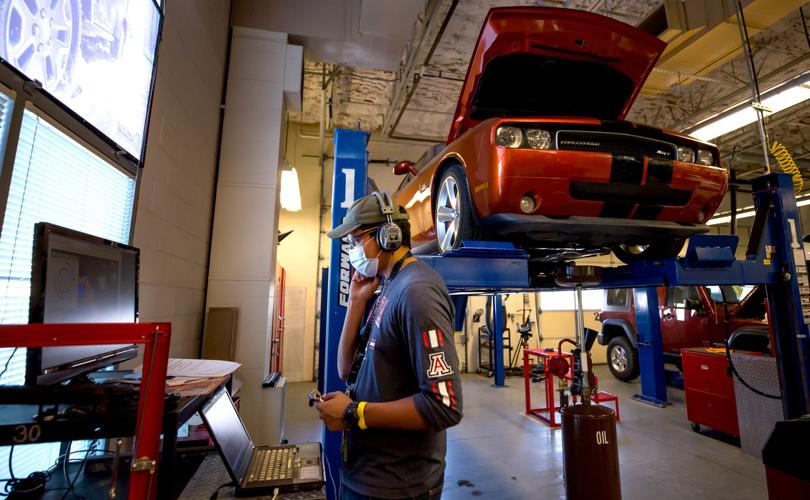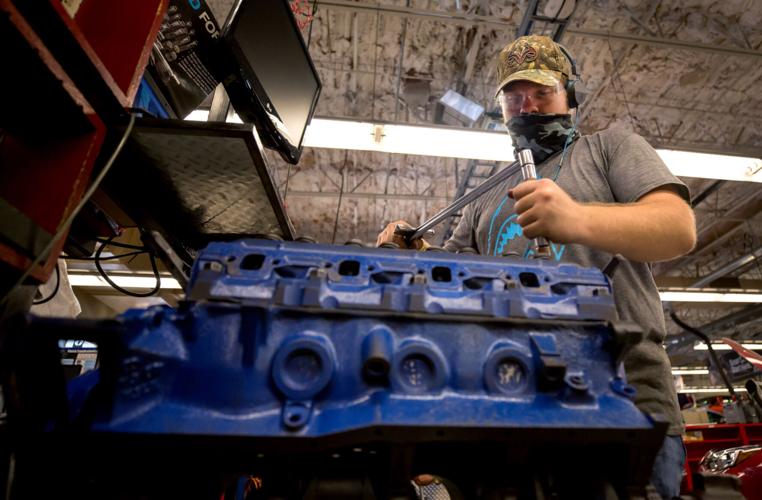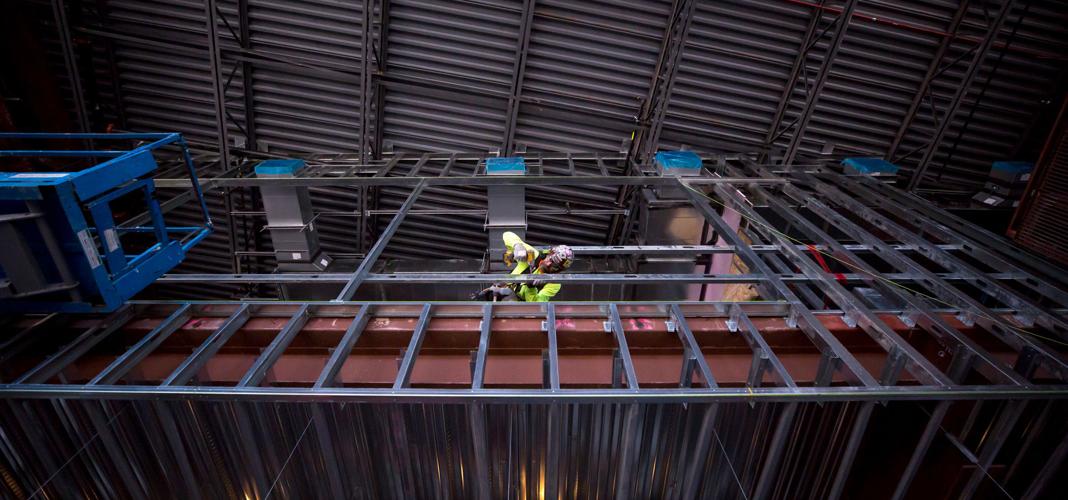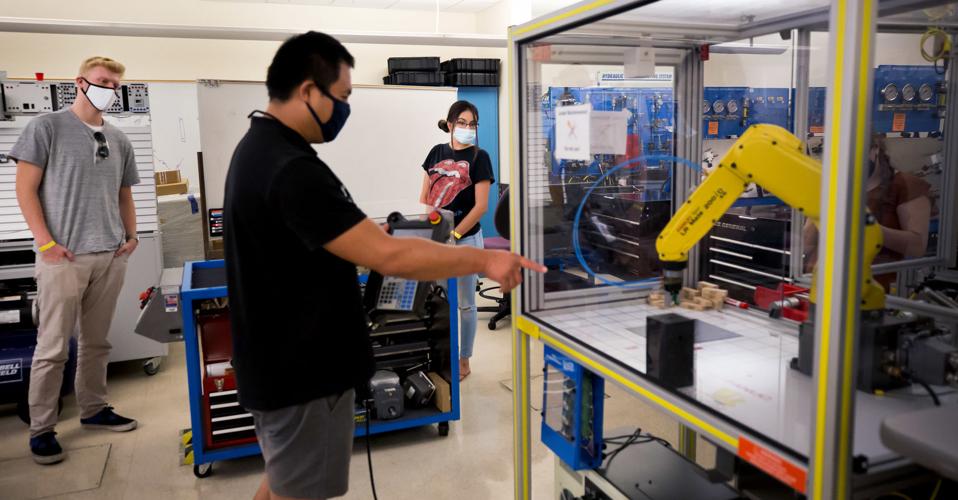Helping lower-wage workers displaced by COVID-19 — particularly hard-hit women and minorities — is the goal of a new effort spearheaded locally by Pima Community College to “reskill” workers for success in a post-pandemic world.
Arizona was recently selected among 20 states to participate in the Reskilling and Recovery Network, a project of the National Governors Association and the American Association of Community Colleges that promotes collaborations to help communities recover from the economic devastation caused by the pandemic.
The main focus of the Reskilling and Recovery Network is helping women and people of color, who have been disproportionately affected by pandemic-related layoffs particularly in the hospitality, retail and service industries.
Network participants aren’t getting any new funding, nor are any new educational programs required as part of the initiative.
People are also reading…
Instead, the network is meant to foster collaborations among community colleges, government agencies, nonprofits and private businesses, building on existing relationships and programs.
Arizona network partners include Pima Community College, Arizona Western College, the Maricopa County Community College District and Yavapai College, representing the state’s 10 community-college districts; the office of Gov. Doug Ducey; the Achieve60AZ Alliance, a statewide nonprofit aimed at helping more Arizonans achieve postsecondary degrees or career certifications; the Arizona Commerce Authority’s Office of Economic Opportunity; the Arizona Community College Coordinating Council; the Greater Yuma Economic Development Corp.; the Pinal County Economic and Workforce Development Department; and aerospace giant Boeing Co.
Jobs of the future
Pima and the state’s other community colleges are well-positioned to help, after recent efforts to train lower-skilled workers for high-tech jobs of the future, said Ian Roark, vice president of workforce development and strategic partnerships at PCC.
Pima had already shifted educational and training priorities to prepare students for a rapidly changing labor market, due to the impact of “industry 4.0” — the evolution toward increased automation, artificial intelligence and cybersecurity — and other factors, Roark said.
“Interestingly and sadly, the same sorts of occupations that are most vulnerable to change or displacement due to automation are the same ones that were hardest hit by the pandemic, and thus the same population groups and communities are disproportionately impacted,” he said.
And Arizona’s community colleges have been collaborating on programs to help students train for higher-paying, technical jobs of the future, under a workforce development initiative launched by the Arizona Community College Coordinating Council about two years ago, Roark noted.
One recent example is the Google IT Support Professional certificate program offered by Pima and seven other Arizona community colleges in June.
The nationally accredited, three- to six-month program can be completed online and teaches troubleshooting, network protocols, cloud computing and encryption algorithms for entry-level jobs as an IT support specialist.
“We already had the essential building blocks of partnership and collaboration to help ‘working learners,’” Roark said, noting that about two-thirds of Pima students attend school part-time while working.
Many details of the Arizona network remain to be worked out, Roark said, noting that a state team of network partners are meeting weekly.
The team will seek input from stakeholders to develop a broad strategy to collaborate on things like increasing apprenticeships, on the job training and hands-on learning.
“It’s going to allow us to align and scale our resources to deliver at the scale needed for the economic recovery,” Roark said.
While states participating in the Reskilling and Recovery Network aren’t in line for any funding, the state network could put Arizona community colleges in a better position to win federal education grants, he added.
Last year, Pima won a $4.23 million U.S. Labor Department grant to lead a consortium of Arizona community colleges and industry partners to develop a new model for manufacturing apprenticeship programs.
An intentional effort
The Reskilling and Recovery Network is a natural fit for partner Achieve60AZ, a coalition of more than 150 organizations and 40 cities formed in 2018 with a goal of ensuring that at least 60% of Arizonans earn a post-high school credential or degree by 2030.
To reach its goal, Achieve60AZ is determined to focus on Native American, Hispanic and African American populations, since they have far lower rates of achieving postsecondary degrees, executive director Rachel Yanof said.
“You just can’t throw spaghetti at a wall, there are actually groups that are faring well,” Yanof said. “We have to be very intentional about saying it’s not just 60%, it’s 60% for all.”
The impact of the pandemic on women cuts across racial and ethnic lines, she added.
“We know that in this current crisis of the pandemic, women are being pushed out of their jobs or their child care, there are so many who aren’t able to stay in the workforce as well as men,” Yanof said.
The reskilling network’s focus on women was welcomed by the Women’s Foundation of Southern Arizona, which runs a program called Pathways that helps single mothers move through career and technical education programs at Pima Community College.
“The deck has been stacked against women and communities of color long before COVID-19,” Women’s Foundation CEO Amalia Luxardo said in an email.
The foundation’s research has shown that more than 500,000 of Arizona’s women and 800,000 children live at or near poverty levels, while 89% of Arizona’s low-income single mothers with children under the age of six only have a high school education, preventing them from achieving economic independence.
“The pandemic has illuminated the fact that women — who are increasingly the heads of households — are disproportionately vulnerable to the effects of a public health or economic crisis,” Luxardo said, noting that women lost 10 years of employment gains in March alone.
“Finding sustainable solutions that level the playing field and increase the earning power of women is essential to long-term meaningful recovery,” she said.
The Pathways program has been recognized as an innovative solution, recently receiving a $95,000 grant from the Bill & Melinda Gates Foundation and the Women’s Funding Network.
Pathways also received $50,000 as winner of the Rise Prize, a national award program that recognizes innovations that help student parents.
Already in the works
Pima Community College is building up its capacity to help more students get the education they need to land jobs in the increasingly tech-based economy.
Pima has expanded its certificate and degree programs in fast-growing tech areas, partnering with self-driving truck developer TuSimple last year on an autonomous vehicle driver and specialist program for experienced truck drivers.
Pima has launched a planned $35 million expansion and renovation of its downtown campus at Stone Avenue and Speedway to support the college’s new Center of Excellence in Applied Technology, including a $12.5 million Automotive Technology and Innovation Center now under construction.
Pima also is building a new Aviation Technology Center at its site at Tucson International Airport — despite the pandemic’s devastating impact on the airline industry.
“Our students are still getting hired right now,” Roark said. “The planes still need to be maintained so that they do not deteriorate for being too idle, and economic activity is picking up.”
Even before COVID-19, Pima had narrowed its focus on career as well as transferable skills in areas with “family-sustaining wages” and prospects for long-term job growth.
Those include automotive technology, transportation, advanced logistics, building construction technology and design; manufacturing including aerospace and defense, optics, automation, fabrication, machining and robotics; aviation technology; information technology and cybersecurity, health science, and emergency services and public safety.
Contact senior reporter David Wichner at dwichner@tucson.com or 573-4181. On Twitter: @dwichner. On Facebook: Facebook.com/DailyStarBiz

























